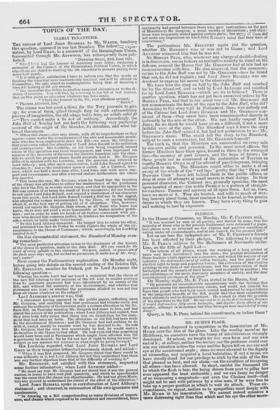PLEDGES.
IN the House of Commons, on Monday, Mr. F. CLINTON said,
"It was asserted by men of all parties, and denied by none, that the majority of those who in the present Parliament were returned fqr populous places were so returned on the express and positive condition of voting under all circumstances,, and at any hazard, for the present Bill." Let us see how the independence of Mr. F. CLusrrox's friends has been affected by their pledges. The following is a copy of Mr. E. PEEL'S address to the Reformers of Newcastle-underLine, on the 27th of April last
" The reform of all abuses, which the working of a long period of years may have introduced into the state ; the gradual diminution of those burdens which oppress our commerce, and retard the success of our industry ; the disfranchisement of rotten boroughs, and the grant of the elective right to large and populous towns; the extension of the elective privilege to one class of our countrymen, and the preservation of their birthright and the reward of their labour and ingenuity to another; the just advantages of the mere fortunate members of society, and the dear constitutional privileges of the poor." On Monday night, Mr. E. PEEL stated in the House, that " He possessed no inconsiderable acquaintance with the feelings that prevailed among the manufacturing classes, and could not conceal his fears that people who had been much roused and excited by expectations of the imaginary benefits of the Bill, would find that their expectations must ultimately end in disappointment. He wished to state the grounds of his objections to the Bill. He objected to it, in the first instance, because it icould disfranchise fifty-seven boroughs, and deprive forty others of one member, although in no instance had those boroughs been convicted of wrong doing." Query, is Mr. E. PEEL behind his constituents, or before them ?
























 Previous page
Previous page